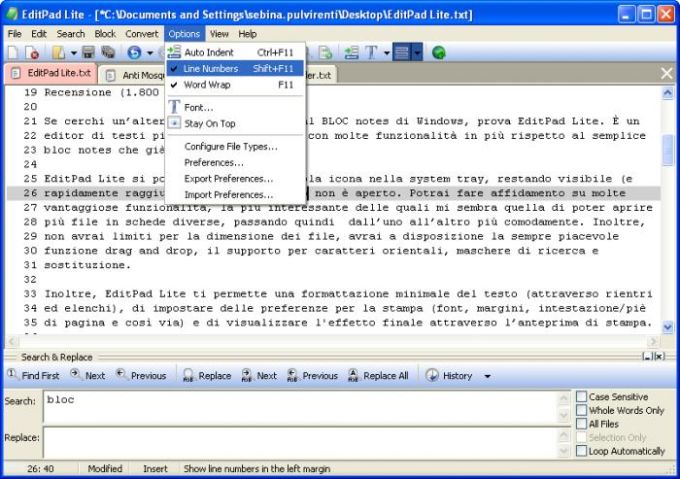
The NEdit interface is simple, almost ugly. There are no toolbars crammed with colorful icons, and no floating pallettes or workspaces to keep track of. Why? It’s one of those applications that does everything that I need an editor to do, but isn’t jam-packed with features that I rarely use. From the outset, I have to mention that NEdit is the text editor that I most use. While widely considered to be a programmer’s tool, NEdit is a great text editor for anyone who needs to manipulate words or files. Negatives: No spelling checker, requires you to have Tcl and Tix installed and properly configured. Positives: Small, easy to use, uncluttered interface.


Installing and using a library can be tricky and time-consuming - something you may not have the patience for.
Editpad lite for mac install#
As well, you need to install a library called Tix in order to run Eddi. I’m hoping that one of the plug-ins Eddi’s developers cobble together is one that supports spell checking apps. On the downside, Eddi doesn’t have a built-in spelling checker, or a way to link to an external spelling program like Aspell. Some of the plug-ins that the developers hope to create include ones for sending and reading email, reading newsgroup posts, and transferring files via FTP. However, the developers say that other plug-ins are in development. Right now, the only available plug-in is for an HTML menu that enables you to add markup to your Web documents with a mouse click. You can configure Eddi to load only the plug-ins you want to use. Plug-ins are little programs that extend the capabilities of software. One feature that sets Eddi apart from most other editors is its use of plug-ins. You can record only keystrokes, but if you have one or more repetitive tasks in your work, the macros you record can save you considerable time and effort. tex for your LaTeX documents), you can apply highlighting using a toolbar option.Įddi also enables you to record macros (short programs that automate tasks). If Eddi doesn’t recognize the file type (for example, you used the extension. If Eddi recognizes the type of file that your working on, it automatically applies syntax highlighting. For example, if you’re building a Web page, the HTML tags might be blue while the actual text is black. Syntax highlighting is the use of color to differentiate between markup and text in a document. If you’re writing in HTML or LaTeX, you’ll find Eddi’s syntax highlighting abilities useful. While both of these features are standard in a number of applications, they are missing from many text editors. Another is the toolbar, which puts all of Eddi’s main commands just a mouse click away - no need to remember combinations of keystrokes or to dig through menus to find the command that you’re looking for. One of Eddi’s nicest features is a tabbed interface that enables you to quickly move between open files. Feature-wise, it’s somewhere between a basic editor like xedit and the other editors being discussed here. While Eddi doesn’t have all of the features of the other editors discussed in this article, it does pack a lot into a very small package. As such, Eddi can be run on any computer that has Tcl installed, regardless of operating system. Eddi is written in Tcl, a popular scripting language. Eddi, NEdit, and EditPad run under just about any Linux window manager.įor pure simplicity, you can’t beat Eddi. While they’re nice applications, not everyone running Linux uses KDE or GNOME. Linux users running the KDE and GNOME window managers can get those tasks done with Kate and gedit, respectively. profile file, mark up documents, and maybe cobble together a simple script. Some of us just want an editor that lets us write easily, edit a.
Editpad lite for mac code#
While features like c-tags, automatic code indenting, and regular expressions are great for programmers, they aren’t useful for everyone. Chances are many Linux users won’t use a fraction of the power of either tool. (In the colophon to his book Just A Geek, Wil Wheaton wrote, “I couldn’t find the text editor in emacs.”) And having to remember a number of keystroke combinations to carry out a simple task is no fun, either. They’re great editors, but they contain too many features.

But many an average user - the non-technical person who may have moved to Linux from another operating system - sees a heavy “geek factor” in most Linux text editors. Of course there is no shortage of text editors for Linux. Eddi gives you enough to get the job done, while NEdit and EditPad offer more advanced features to keep even demanding users happy. Here are three text editors that balance ease of use with robust feature sets. With text editors, you can perform a variety of tasks: coding and scripting, editing system files, building Web pages, and writing documents like letters and articles. A good text editor is an invaluable tool.


 0 kommentar(er)
0 kommentar(er)
